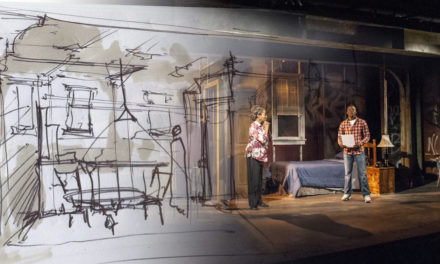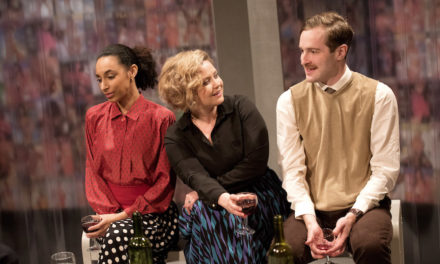Most theater productions will never become available again, no matter how great the quality, because of copyright and technical reasons. However, theater critics around the world are leaving behind a written, often detailed record, as witnessed by the articles on The Theatre Times. Frequently illustrated, these theater reviews—ranging from sketchy to thorough—bring back descriptions of works on live stages for everyone, now and in the future.
Coming from Europe, my perceptions of life were shaped by a wide range of European and American playwrights. Now living in the U.S., I noticed the occasional denigration of American culture by Americans, who seem to favor European works the way the ruling class in Czarist Russia and Poland spoke French or German instead of Russian or Polish as if their mother tongues were inferior to the foreign culture-associated languages they adopted.
It’s against this background that I would like to honor the work of one of our most thorough theater critics in Philadelphia, J. Cooper Robb, who unfortunately passed away recently, with this Open Letter to my late colleague about a subject that I wanted to discuss with him, except that I discovered this controversial topic of perceived “inferiority” only now while reading every single one of his many theater articles online—alas, too late for his personal response.

American theater critic, J. Cooper Robb (1960-2019). Courtesy Karl E. Carter and the J. Cooper Robb estate.
Dear Cooper,
I always liked reading your articles. They differ from the majority of regular theater reviews. You often went further and presented holistic views of the theater world—something I valued, let alone your immense knowledge of the theater and the people who make it all happen.
I appreciate this wonderful write-up about your life in the Philadelphia Inquirer. As soon as I learned that you had left us for good, I searched the Internet and read every article of yours I could find, including all your regular submissions to TheaterMania: what a treasure, ranging from 2001 to 2011. I certainly miss your previews and especially your theater essays.
“Demeaning the American theater is something of a parlor game among certain critics.” J. Cooper Robb
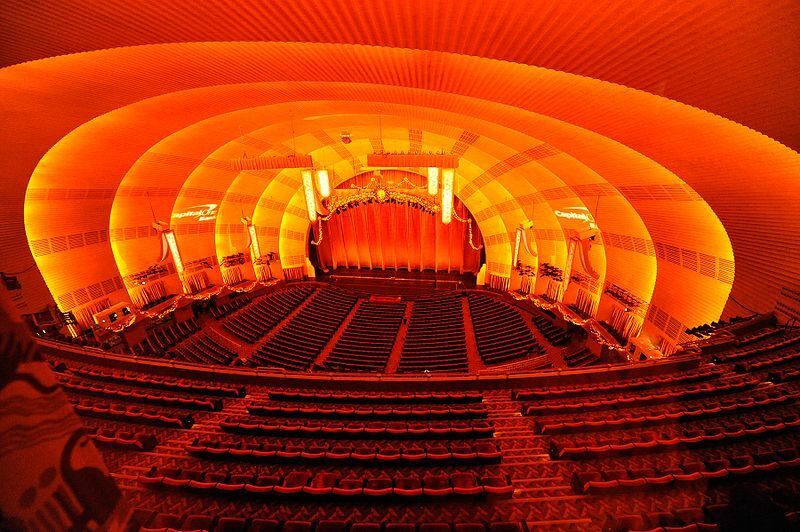
From classical, open-air Greek theaters to Radio City Music Hall, New York. Wikipedia photo of Radio City Music Hall.
Cooper, I regret that I did not have the opportunity 16 years ago to read an article of yours in which you got pretty tough on “certain critics”:
“Demeaning the American theater is something of a parlor game among certain critics, who point to the theatrically rich cultures of Ireland, Germany, and England as proof of the United States’s inferiority in this area.” (TheaterMania, Jan. 14, 2003)
Frankly, I never met anyone who made such a claim, even though I wouldn’t be surprised. Perhaps some other theater critics might respond in detail to your concern that certain Americans might value European theater at the expense of American theater.
However, I am aware that quite a few Americans who travel to Europe at times seem to take on a touristy perspective, which tends to favor Europe’s old culture over America’s modern civilization—a situation that quickly can lead to a “Touristic Bias: Why Americans Overrate Europe, and Europeans Underrate America.”
Similarly, Operavore of WQXR, New York Public Radio, asked, “Can America Keep Pace With European Opera?” Another search reveals that much has been written about “What differentiates Europeans from Americans: the cultural gap across the Atlantic.”
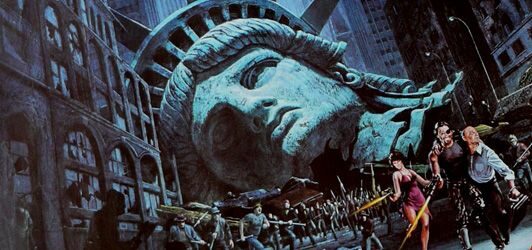
Statue of Liberty collapsing. Movie poster for Escape from New York, set in the future year of 1997. Courtesy Goldcrest Films.
Just one telling example: The much-talked-about Christopher Shinn, a U.S. playwright, and director who made major breakthroughs at London’s Royal Court Theatre, succinctly described some of the main differences between responses to new plays by actors and directors in New York and London in the Guardian:
“New York actors and directors are much more directly critical of a new play in rehearsals than London actors and directors are. In London, I cannot remember a single moment when an actor openly criticized–even implicitly–my text. Any note a director gave me was given privately, quietly and tentatively.”
Cooper, I have come to the conclusion that you were more cosmopolitan than you might have realized. You presented drama from all over America, Africa, Asia, and Europe in thoughtful and caring ways.
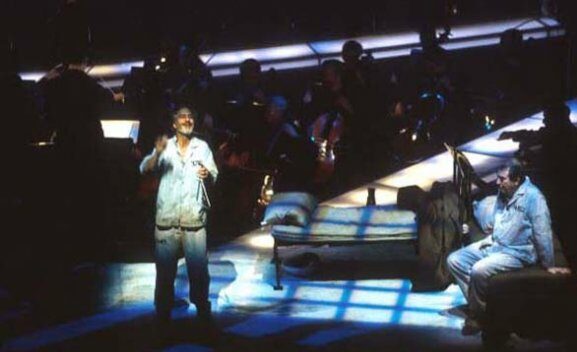
Dissident in Russian mental asylum. A scene from Tom Stoppard’s Every Good Boy Deserves Favor, The Wilma Theater, Nov. 2002.
Below, to back up this claim, examples of the factual way you presented Russia in your TheaterMania reviews. On top of it, you certainly did not neglect Russian culture, including its darker side, as witnessed by your pivotal interview with Sir Tom Stoppard about one of his Russian plays (see: “Probing Tom Stoppard on Russia: Part of the legacy of theater critic J. Cooper Robb”).
Making it Big
“The Philadelphia Theatre Company is producing the first family production in their history with their staging of storyteller David Gonzalez’s The Frog Bride. For this contemporary adaptation of an old Russian fairy tale, Gonzalez employs a jazz-funk score and video projections to bring a modern slant on the classic coming-of-age story about a prince who goes in search of a wife and instead returns with a frog.” (Nov. 30, 2006)
School for Scandal
Cirque du Soleil’s Alegria returns to Philly at Temple University’s Liacouras Center. Visually dazzling (Dominique Lemieux’s costumes are a sight to behold), the show’s new “arena” staging includes two especially wondrous acts: the breathtaking aerial ballet “Russian Bars” and the fast-paced “Power Track,” in which a group of athletic tumblers perform daring routines on a trapeze [. . .]. (September 30, 2009)
A Different Dream
Hedgerow Theatre continues their summer tradition of presenting a farce from Brit playwright Ray Cooney with the theater’s production of Cooney’s Chase Me, Comrade! Inspired by the defection of Russian ballet star Rudolph Nureyev, the story follows a Russian dancer who seeks refuge with a British government official. Featuring Cooney’s usual frenzied pacing, the play is a madcap romp of mistaken identity and barely controlled chaos. (July 31, 2010)
South Central
Lantern Theater opens their season with Anton Chekhov’s classic tragicomedy Uncle Vanya. The story focuses on the long held resentments and secret longings among the members of a Russian family who are reunited at their once glorious pastoral family estate. In conjunction with their production, Lantern hosts a mini Chekhov Festival with special pre-show performances of the playwright’s short farces, as well as discussions with Chekhov scholars and even a Russian themed dinner party. (October 31, 2010)
An American critic’s cosmopolitan perspective
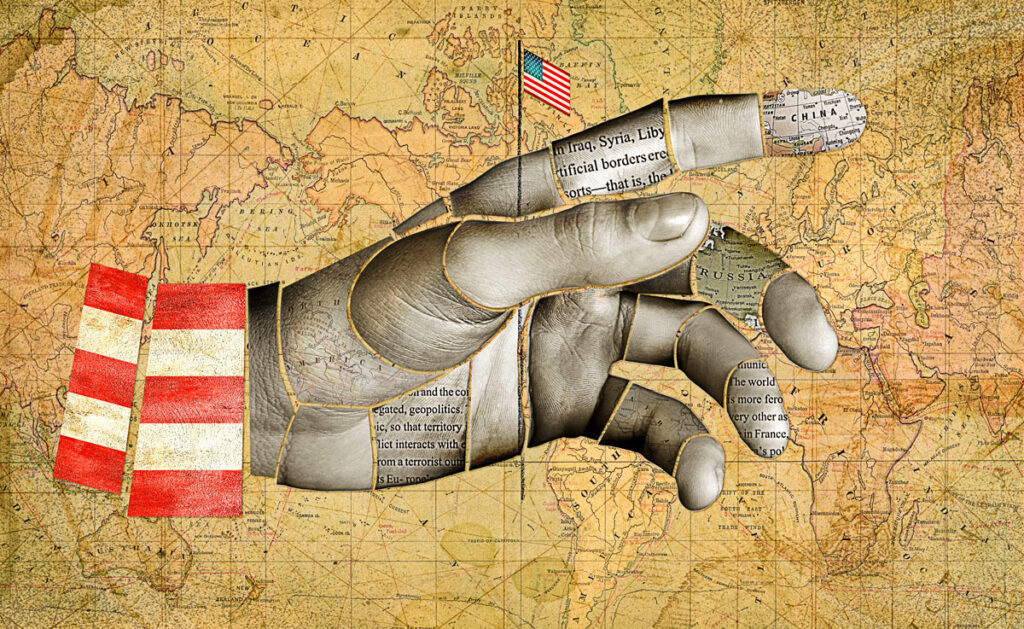
Montage of a recreated American hand against an old world map. Photo courtesy Dallas Morning News.
Do American theater critics carry a bias in favor of European drama over U.S. drama? Some may, most others probably do not. You reported about theater by European playwrights or European-based plays with the same balance as you reported about American theater—and I want to thank you. I’m sure many of your readers felt good about your work as they could trust your assessments and buy tickets to shows you had recommended with confidence.
Cooper, I salute you for all you’ve done for the theater world in general and the many Philadelphia stages in particular and wish you Bon Voyage on your journey into timelessness.
I shall miss your writing.

Young man stargazing. Courtesy YourQuote.
This post was written by the author in their personal capacity.The opinions expressed in this article are the author’s own and do not reflect the view of The Theatre Times, their staff or collaborators.
This post was written by Henrik Eger.
The views expressed here belong to the author and do not necessarily reflect our views and opinions.


